In Germany pugs are the stars winning medals (and hearts) on the racetrack
Small, feisty and endearingly wrinkly, Germany’s racing pugs are inspiring a cult-like devotion. Melissa Eddy meets some of the stars who compete to see who is the fastest. Or slowest
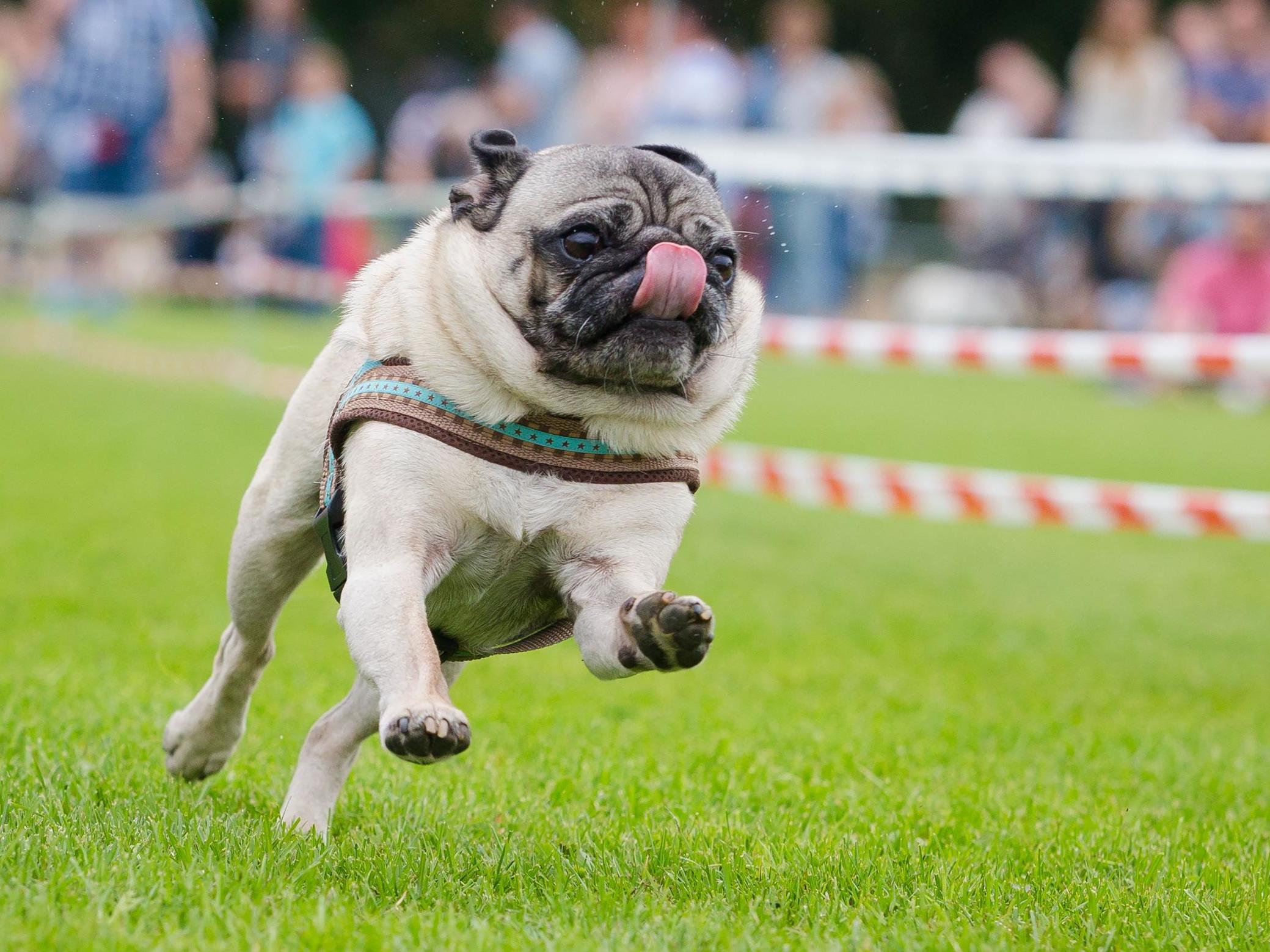
If Elvis has one advantage over his competitors, it is his long legs. Well, relatively long. His slightly extended snout and slender body also helps him swallow the 80-yard stretch of sandy track in just more than eight seconds.
“Sensational,” the timekeeper calls as Elvis pounds across the finish line and bounds into the arms of his 13-year-old owner, Emma Pollex, who has run ahead, shaking a small, zipped bag packed with treats.
Elvis is one of the star pugs at the Hamburg NWR dog track on the outskirts of the northern German port city.
“He’s really fast,” says Emma, and likes to run, so much so that Elvis didn’t even need to train before going up against the 49 other competitors.
Along with Joschi, Campino and dozens of other curly-tailed pugs, Elvis is competing in what has become a regular effort in Germany to blow up the breed’s reputation as committed couch potatoes.
Sometimes, the reputation seemed justified. Campino needs a push just to get him past the starting line. Lulu stops midway for a sniff before dashing backward, then turning around and casually trotting across the finish, taking a leisurely 32 seconds.
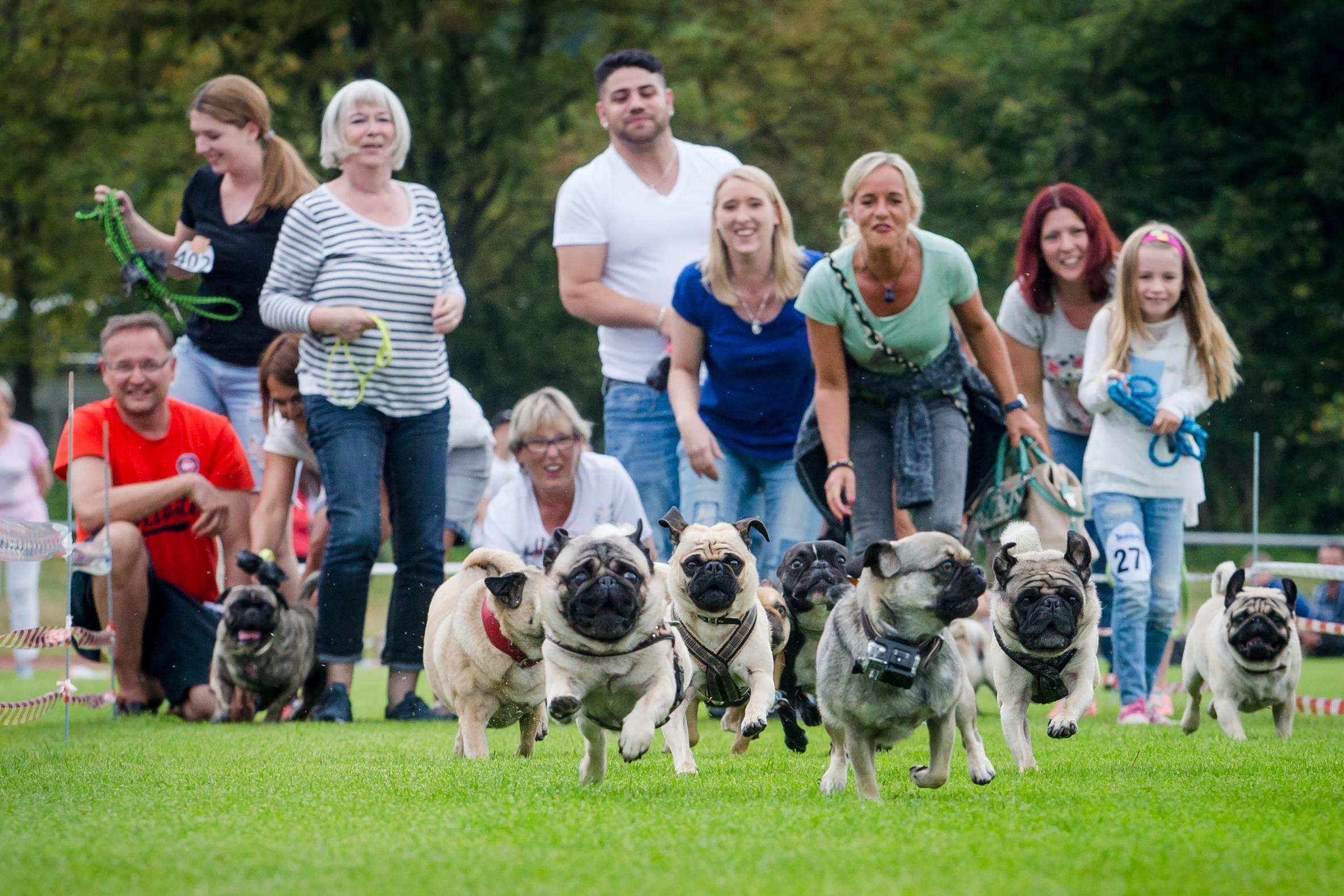
“This isn’t a competitive race,” says Angelika Schmorr, Lulu’s owner. “We are all here just for the fun of it.”
In the country that gave the world the German shepherd and the doberman pinscher, short-legged, smashed-nosed pugs, called “Mops” in German, would seem out of place. But the animals have long been celebrated across this country for their loyalty and clown-like temperament, and as subversive symbols.

Introduced to Europe from China, pugs made their way to Saxony in eastern Germany in the 18th century, where they became the mascot of a group of excommunicated masons who called themselves The Order of the Pug.
Around the same time, a designer at the royal Saxon porcelain factory in Meissen began casting pug figurines that became popular at court. They are still produced and sold today.
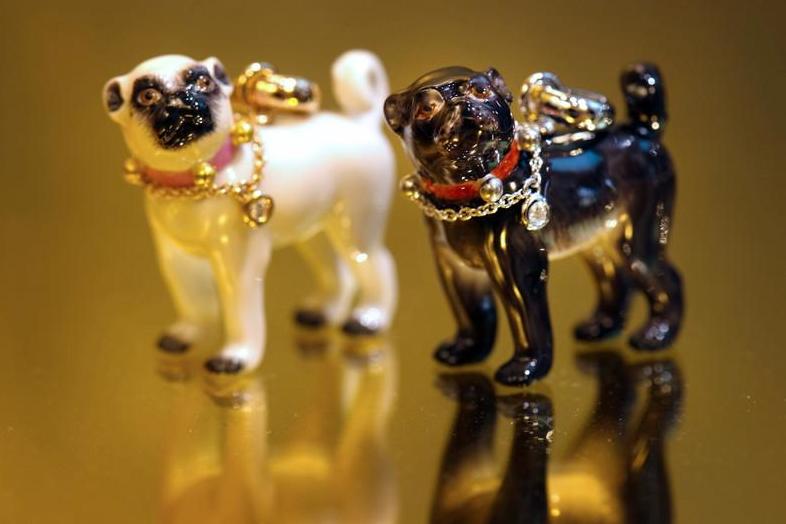
More recently, German comedian Vicco von Bulow, known by his stage name Loriot, has boosted the breed’s popularity in this country, featuring the dogs in his work and declaring: “A life without pugs is possible, but meaningless.”
As the dogs’ popularity has grown, events for pug owners and their animals have sprung up across Germany. While many of these feature “races”, the winners are as much the pets who display their particularly pug-like attributes – which does not necessarily include speed.
A decade ago, Thomas Zupan and his wife, Beate, pug breeders, organised the annual International Pug Meeting in Berlin. It features a 50-yard dash timed with state-of-the-art photo finish equipment and prizes for the fastest – and the slowest – pugs.
The event has drawn participants from across Europe and spectators from across the city. But this year, the city animal welfare authority cancelled the pug race at the last minute because of extreme heat, although the gathering still took place.
When Zupan announced the dogs would not be running, boos and groans went up from the owners of 95 pugs poised to compete – who were unleashed and happily tearing about a vast fenced-in yard that was supposed to serve as the racetrack.
Days earlier, the German branch of People for the Ethical Treatment of Animals had warned that the dogs’ snouts and palates were “too short, which makes it difficult for them to breathe”, even in cooler temperatures.
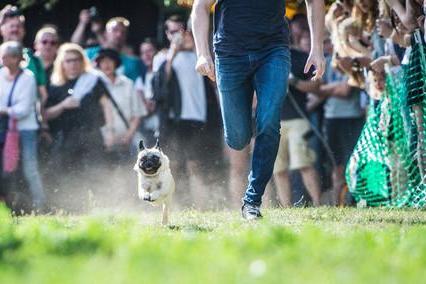
Many owners blame the race’s cancellation on the warning, and say the activists failed to understand their fun, and their dogs.
“A pug will know if they want to run or not,” says Ursula Streich, owner of Hanna. “If they don’t want to run, then they will just lie down. You can’t do anything about it.”
Ashley Reinhart says cancelling the race makes no sense. She is at the event with Kirby and Thor, two rescue pugs. The animals had made their way across the Atlantic with Reinhart and her husband when they moved earlier this year from Pennsylvania to Lubeck, northern Germany, for work.
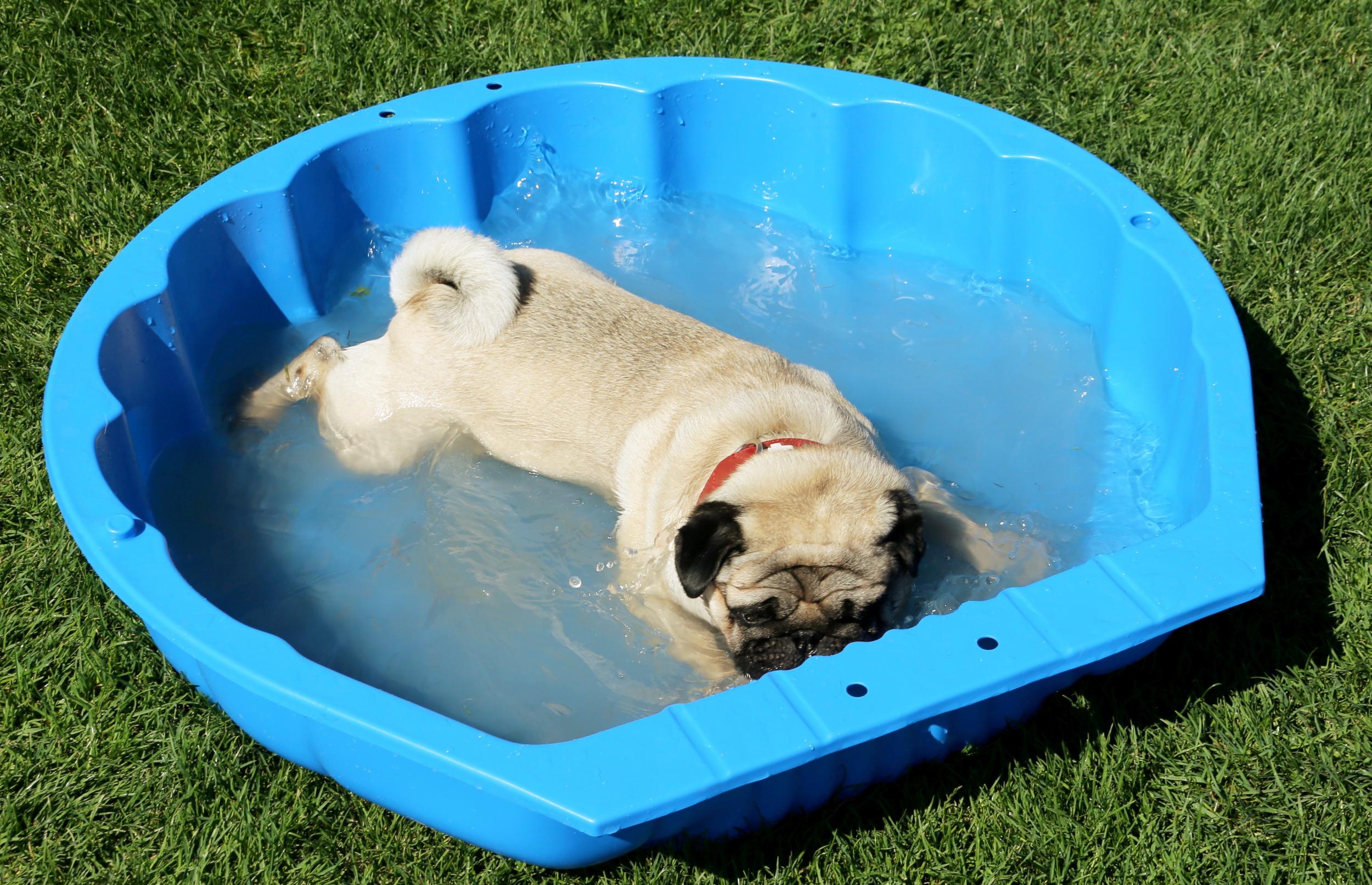
“It’s very unlikely that any pug parent would put their pug in harm’s way,” says Reinhart, who refers to herself as the mother of Kirby and Thor.
“These dogs are like your kids,” she adds, sitting in a camp chair beside a small tent set up to shade her dogs. “If they can’t handle the heat, you would know and as a responsible parent, handle it accordingly.”
Neither Thor, who has use of only three legs, nor Kirby have been registered for the race. Like their owners, they have come along just for the camaraderie.
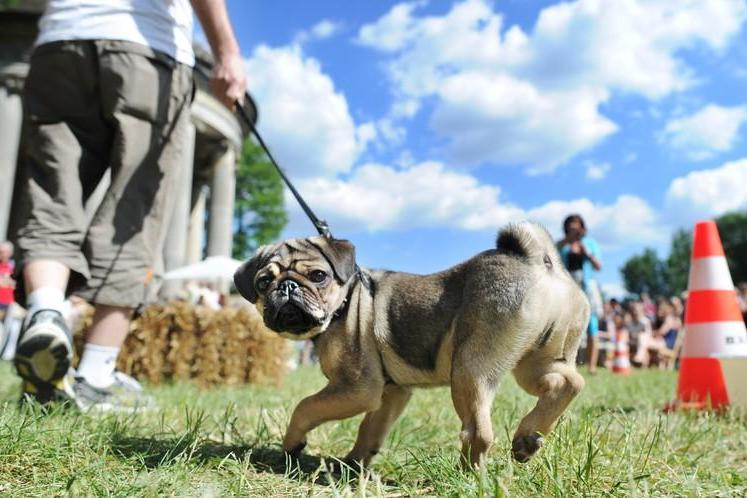
Thor and Kirby have their own Instagram account, @expatpugs, so friends back home can keep up with their adventures in Germany. They join other pug social media stars, like Hamilton Pug and Doug The Pug, who have captured the attention of millions.
But long before Twitter and Facebook, or even Frank the pug’s debut as an alien disguised as a dog in Men in Black, Germans had their own set of pug stars, Meier and Pohlmann.
In 1971, the country was glued to TV sets, watching as a pair of pugs descended from a spaceship to leave their paw prints on the face of the moon, or at least a low-budget copy of them. The ability of the “astronauts”, in the sketch by Loriot, to survive in outer space without special suits was attributed to their “new breathing technique” and “unbelievable resistant body form”.
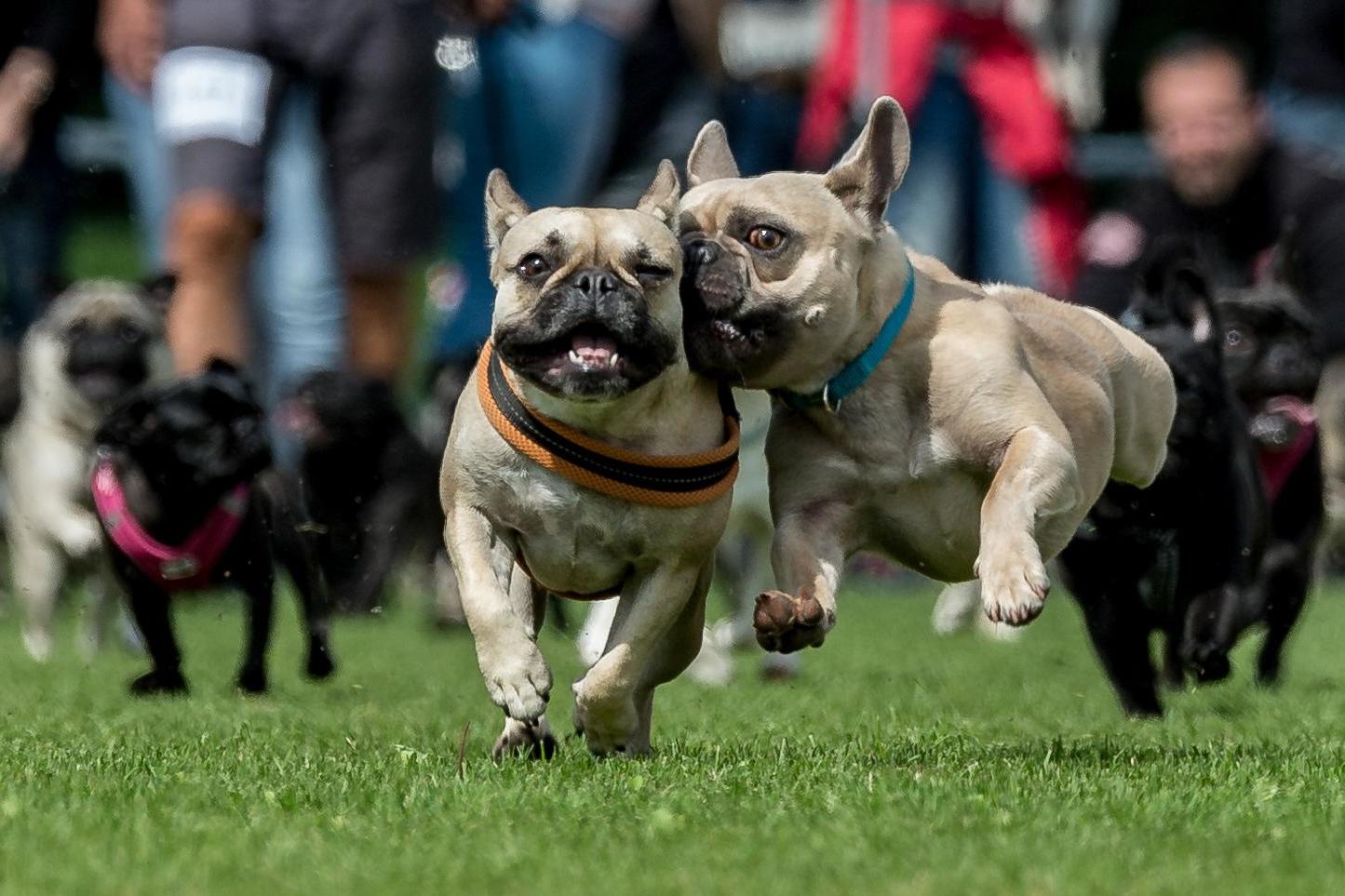
Last year Emma was the most celebrated pug in Germany, called the “Usain Bolt of Pugs” after winning her third straight race in Berlin with a record time of under six seconds. Like Elvis, this year’s winner in Hamburg, Emma is a variety of pug in Germany known as an “Altdeutsche Mops” or “Old German pug”.
In Germany, both the Altdeutsche strain and more recent efforts to crossbreed pugs with Jack Russell terriers, so-called “Retro Pugs”, have become increasingly popular.
Schmorr, the owner of Lulu, the pug who took a more circuitous route to the finish line in Hamburg, confesses that she was uninterested in the breed until she took in the pug that had belonged to her late mother.
That was six years ago. When that pug died, she knew she needed another one.
”Pugs don’t leave anyone indifferent,” she says. “Either you hate them or you love them – and if you do, you can’t live without them.”
© The New York Times
Join our commenting forum
Join thought-provoking conversations, follow other Independent readers and see their replies
Comments
Bookmark popover
Removed from bookmarks